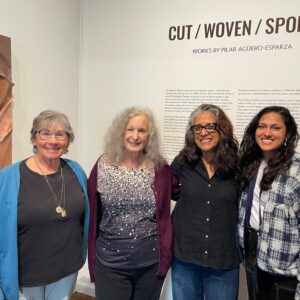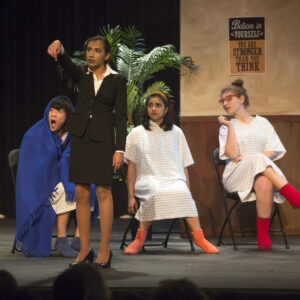This article originally appeared in the spring 2015 Harker Quarterly.
In January, Student Directed Showcase put on its 14th show, further cementing its status as one of the Harker Conservatory’s key programs.
The class, available to students who are selected after a thorough review process, puts students in the director’s chair and charges them with handling all aspects of putting on a show, including casting, blocking (positioning and movement of the actors on stage), visual elements, promotion and everything in between.
“The college counselors tell me it’s up there with one or two APs in terms of the load that a student will have when they choose to direct,” said performing arts department chair Laura Lang-Ree, who runs the class. “If a student chooses to direct, they often will know [of their interest by] seventh or eighth grade. They’ve been coming to SDS or they’ve heard about SDS and they have this passion for leading something, though they may not really know what it is.”
Lang-Ree got the idea for SDS while in graduate school. “I’ve always had a passion for all different types of performing, from dance to instrumental to theater, but when I took [a] directing class, all the light bulbs went on,” she recalled.
After earning a master’s in acting with an emphasis in directing, Lang-Ree began teaching performing arts at the upper school, where she set the wheels in motion for the first Student Directed Showcase. “Too often, in schools and in colleges too, the focus is on one area. Usually it’s performance, and there isn’t a whole lot of attention given to all of the other many, many areas of art that you can not only fall in love with but have a career in,” she said.
Like Lang-Ree, many Harker students have discovered their interest in directing through acting. “I remember my freshman year experience in SDS so clearly,” said senior Caroline Howells, who directed “Almost, Maine” at this year’s SDS and was one of four directors in the class. “I have such fond memories of it, and I’ve done it every year since, and when it came meme to apply to be a director I said, ‘Sure, let’s do this.’”
“I loved my directors, I loved the shows and I loved my characters,” said Zoe Woehrmann, grade 12, director of “Exit” at the most recent SDS. “All of my [fellow] directors ended up becoming huge role models for me.”
The process of selecting directors begins early in the spring semester, when Lang-Ree finds students who are interested in directing a play. “Around March or April, I’ll send them a series of questions to answer in written form and they’ll come and meet with me and we just talk,” she said. After taking a close look at every candidate’s work in the Conservatory, as well as “all the classes that they’ve taken here, leadership that they’ve done inside and outside of Harker,” she receives feedback from school administrators and selects the following year’s directors.
Once the students accept their role as directors, they are given the summer to choose a play, which can be a lengthy but extremely important process. “When you’re going to work on something that intensely and that deeply every single day and you literally can’t stop thinking about it, you’ve got to love it,” said Lang-Ree. “It really has to speak to them.”
Selecting a play proved time-consuming for Howells, who looked at about 50 plays before settling on “Almost, Maine,” a romantic urban fairy tale set in a fictional town. “I read the first scene, the prologue scene, which is very iconic for the show, and I just knew I had to do it,” she said.
“I didn’t actually know what I wanted, but I knew what I didn’t want,” Woehrmann said. “I realized I wanted a heavy ensemble show. I didn’t want one protagonist.” “Exit,” which examines five characters who awaken to find themselves in a theater with no memory of how they arrived, was a perfect fit.
Once the plays are chosen, Lang-Ree meets with the directors to analyze and dissect their plays, which helps them discover what they will be looking for when choosing cast members.
“I think the lion’s share of the academic work is taking these scripts and breaking them apart into the specific acting unit,” said Lang-Ree. “What’s the point of attack? What is the protagonist’s goal? Where is the climax for the production? How does it arc?”
Directors also read one anothers’ plays and offer their own insights. The thorough analysis process gives students “plenty of room to play with their casts and get their interpretation and their feedback,” Lang-Ree said.
About 50 students audition for each play, and the directors work with one another and Lang-Ree to decide who will appear in each production. The entire process takes place in a single evening. “We discuss who is going to be in which production and why, what’s best for the student who’s auditioning, what’s best for the production, and because we know each other so well, usually it’s a pretty collaborative night,” said Lang-Ree.
For some students, the transition from acting to directing can be daunting at times. “It was completely weird for me,” said Woehrmann. “Honestly, when I walked into the first rehearsal and I was the only one there and I was setting everything up and sitting in the director’s chair, I was like, ‘What am I going to say to them?’”
“I always knew that it took a lot to put on a play, but I never realized how much thought and planning goes into every moment. Every scene, every blocking choice, every rehearsal is carefully thought out,” said Grace Hudkins ’08, who directed “The Importance of Being Earnest” in the 2008 production. “You never know what an actor is going to need and you have to be prepared with a ton of tools in your back pocket ready to support whatever gets thrown at you.”
Not surprisingly, the nature of each director’s play results in different directing styles, which can include taking some creative risks. When Woehrmann revealed “Exit’s” surprise ending to cast members after keeping it from them for a period of time, she was relieved that they liked it.
After callbacks with her cast, Howells replaced an entire scene with another one from the play she was directing, which led to some worry about how her actors would handle it. “The first rehearsal I had with them, I actually breathed such a sigh of relief because they actually had pretty good chemistry on stage,” she said. The changes didn’t end there. “If you look at the script of my show, it has very, very specific stage directions, and I pretty much ignored most of them.”
The first-time directors also experienced other challenges that directors face on a project. “With some people in my cast, I wasn’t always quite sure how to communicate with them,” said Howells. “Like, what does this person need in order to get them to the point that I want them to be at? And so definitely with some people it took me longer to find that point, but they all got there in the end.”
Scheduling was another issue. “When you have 10 different people who all have different days where they’re not available, it’s very hard to find time,” Howells said. “And we have our own lives too.
This wasn’t the only thing that I was doing after school.” Because Woehrmann’s “Exit” did not utilize any scenery, she had to get creative with blocking to keep the action from looking too static. “I kind of didn’t want them to be walking aimlessly,” she said. “Because I wanted them to focus on the important parts, but I didn’t want them to be standing still in the middle of the stage not doing anything.”
Moreover, the live setting of a theater production always presents uncertainty. “I was terrified that they were going to forget a line, or that a costume was going to go missing or that a cue wasn’t going to happen. All of these things were constantly going through my head,” Woehrmann said.
“One of the most challenging things about SDS is that you’re not just the director; you’re the stage manager, the set designer, the costume designer, the publicist, the entire production team,” said Hudkins.
Thankfully, the actors’ growth during rehearsals and the confidence they had in the directors were a constant source of inspiration. “When you see people place their trust in you, it makes you care in such a different way than I ever have doing a show,” said Howells. “Having them place so much trust in you, it made make me work harder for them. They’re all my best friends now.”
During discussions with her cast, Woehrmann was pleased to discover that they had thrown themselves fully into their roles and had spotted aspects of their characters’ development that she hadn’t noticed.
Despite the challenges that come with directing a show, the directors find the experience to be highly rewarding. “The Thursday before we had an audience, when we ran through the whole show, I started crying,” Woehrmann said. “Because after it ended, it was just such a relief and we were so proud of our casts and that everything had come together.”
“Being a student director was challenging, it was exhausting, and it pushed me to my breaking point and beyond,” said Hudkins. “But it was also probably my favorite thing I did at Harker, and one of my proudest accomplishments.”
SDS also develops skills that extend far beyond the theater and into a wide range of careers. “Of course it’s a highly artistic process,” said Lang-Ree, “but everything that they’re doing, they’re literally going to use from now on: how to plan a meeting, how to handle a hard conversation, how to organize advertising for your event and make it successful, how to build a team that respects and likes you, how to make phone calls, how to put in receipts, how to go shopping for things.”
“It makes me more confident going forward in college and if I want to do auditions during college, then I’ll be able to handle all of that,” said Woehrmann.
Howells felt similarly. “In the college program I’m going to, I know I’m going to have a lot of different opportunities to act and sing and direct and other things like that, and so I hope that this is just the first show of many,” she said.
Hudkins, who graduated from Mount Holyoke College and now teaches drama at an international school in South Korea, attributes her trajectory since graduation to her time as an SDS director. “When I got to Mount Holyoke, I was already poised in my first year to take on major roles in production teams in our student theater organization, and I became involved practically by accident,” she recalled. Upon graduation, she became an intern at the school where she now works. “I truly believe that you can draw a straight line from SDS to my extensive college theater experience to my current career,” she said.













